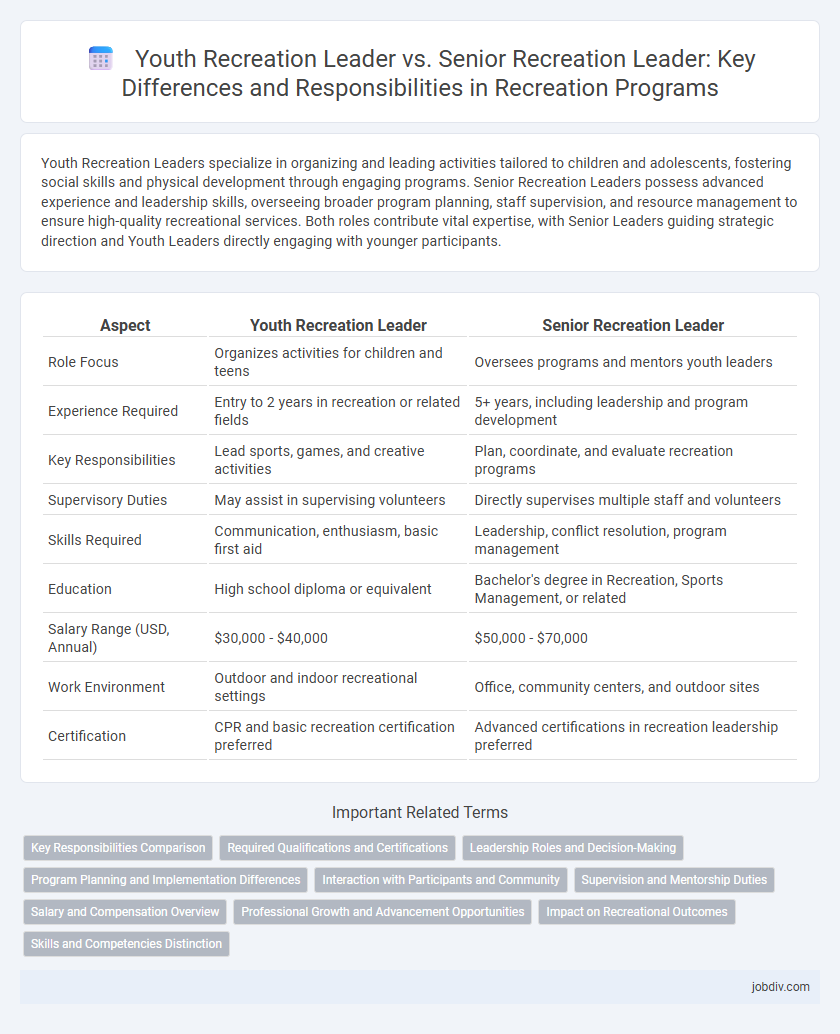Youth Recreation Leaders specialize in organizing and leading activities tailored to children and adolescents, fostering social skills and physical development through engaging programs. Senior Recreation Leaders possess advanced experience and leadership skills, overseeing broader program planning, staff supervision, and resource management to ensure high-quality recreational services. Both roles contribute vital expertise, with Senior Leaders guiding strategic direction and Youth Leaders directly engaging with younger participants.
Table of Comparison
| Aspect | Youth Recreation Leader | Senior Recreation Leader |
|---|---|---|
| Role Focus | Organizes activities for children and teens | Oversees programs and mentors youth leaders |
| Experience Required | Entry to 2 years in recreation or related fields | 5+ years, including leadership and program development |
| Key Responsibilities | Lead sports, games, and creative activities | Plan, coordinate, and evaluate recreation programs |
| Supervisory Duties | May assist in supervising volunteers | Directly supervises multiple staff and volunteers |
| Skills Required | Communication, enthusiasm, basic first aid | Leadership, conflict resolution, program management |
| Education | High school diploma or equivalent | Bachelor's degree in Recreation, Sports Management, or related |
| Salary Range (USD, Annual) | $30,000 - $40,000 | $50,000 - $70,000 |
| Work Environment | Outdoor and indoor recreational settings | Office, community centers, and outdoor sites |
| Certification | CPR and basic recreation certification preferred | Advanced certifications in recreation leadership preferred |
Key Responsibilities Comparison
Youth Recreation Leaders primarily organize and supervise activities tailored to children and adolescents, ensuring a safe and engaging environment that promotes social, physical, and emotional development. Senior Recreation Leaders oversee program planning, staff coordination, and resource management for diverse age groups, while providing mentorship and leadership to junior staff. Both roles require strong communication and organizational skills, but Senior Leaders have added responsibilities in strategic planning and community outreach.
Required Qualifications and Certifications
Youth Recreation Leaders typically need a high school diploma or equivalent, with certifications in CPR, First Aid, and youth leadership training to ensure safety and effective guidance. Senior Recreation Leaders require advanced qualifications, often including a college degree in recreation, kinesiology, or a related field, alongside certifications in advanced first aid, lifeguarding, and program management. Both roles demand strong communication skills, but Senior Recreation Leaders must also demonstrate experience in supervisory responsibilities and conflict resolution.
Leadership Roles and Decision-Making
Youth Recreation Leaders primarily focus on organizing and supervising activities, fostering teamwork, and supporting youth engagement through hands-on interaction. Senior Recreation Leaders hold advanced leadership roles involving strategic planning, resource management, and making critical decisions to enhance program effectiveness and community impact. Their decision-making responsibilities include evaluating program outcomes, managing staff, and ensuring compliance with safety and regulatory standards.
Program Planning and Implementation Differences
Youth Recreation Leaders focus primarily on designing age-appropriate activities that engage children and adolescents, emphasizing developmental benefits and safety protocols. Senior Recreation Leaders oversee broader program planning, integrating community resources and managing diverse participant groups while ensuring strategic alignment with organizational goals. Their implementation includes supervising staff, evaluating program effectiveness, and adapting initiatives based on participant feedback and evolving recreational trends.
Interaction with Participants and Community
Youth Recreation Leaders foster positive engagement with children and adolescents by organizing interactive activities that promote teamwork and personal development. Senior Recreation Leaders enhance community involvement by coordinating diverse programs that address broader age groups, often collaborating with local organizations to ensure inclusivity. Both roles emphasize strong communication skills and community outreach to build supportive recreational environments.
Supervision and Mentorship Duties
Youth Recreation Leaders primarily focus on direct supervision of participants during activities, ensuring safety and engagement while gaining foundational leadership experience. Senior Recreation Leaders oversee multiple Youth Leaders, provide advanced mentorship, and develop training programs to enhance team performance. The Senior role requires a deeper understanding of group dynamics and strategic planning to foster a supportive recreational environment.
Salary and Compensation Overview
Youth Recreation Leaders typically earn an average salary ranging from $30,000 to $40,000 annually, reflecting entry-level responsibilities focused on organizing and supervising youth activities. Senior Recreation Leaders receive higher compensation, often between $45,000 and $60,000 per year, due to advanced duties including program development, staff supervision, and budget management. Benefits for both positions can include health insurance, retirement plans, and paid time off, with Senior Recreation Leaders generally qualifying for enhanced compensation packages and leadership incentives.
Professional Growth and Advancement Opportunities
Youth Recreation Leaders develop foundational skills in program planning and youth engagement, gaining hands-on experience in coordinating recreational activities. Senior Recreation Leaders build on this expertise by taking on advanced responsibilities such as supervising teams, managing budgets, and leading community outreach initiatives. Career advancement often involves transitioning from direct youth interaction roles to strategic leadership positions, enhancing professional growth within the recreation field.
Impact on Recreational Outcomes
Youth Recreation Leaders foster engagement and skill development among younger participants, creating a foundational impact on recreational outcomes by promoting early socialization and active lifestyles. Senior Recreation Leaders influence broader program effectiveness through strategic planning, leadership mentoring, and community collaboration, enhancing long-term participation rates and diverse activity offerings. Both roles contribute uniquely, with Youth Leaders driving immediate participant enthusiasm and Senior Leaders ensuring sustainable recreational success.
Skills and Competencies Distinction
Youth Recreation Leaders excel in engaging younger participants through creative activities, strong communication, and conflict resolution skills, fostering a positive environment for youth development. Senior Recreation Leaders demonstrate advanced competencies in program planning, team leadership, and strategic decision-making, managing diverse groups and complex recreational events. The distinction lies in the Senior Leader's ability to oversee staff, optimize resources, and implement long-term recreational goals, building on foundational skills honed by Youth Recreation Leaders.
Youth Recreation Leader vs Senior Recreation Leader Infographic

 jobdiv.com
jobdiv.com